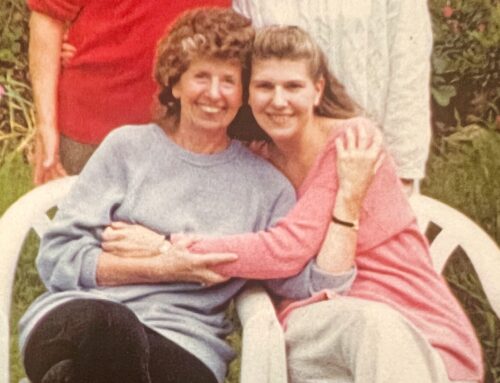Bring to mind someone in your life whose behaviour you’d like to change.
Maybe someone you work with is hopeless when it comes to deadlines; their slack attitude is impacting your ability to set your own schedule.
Or it might be a family member – someone who manages to gently undermine anything that happens to you, and cast you into a role you’ve long since grown out of.
You want them to do things differently, but how? After all, you’re an intelligent person – there’s probably plenty of approaches you’ve already taken to change how things are.
When you’ve tried everything

And yet they’re still there, sapping your energy and churning your stomach whenever you think of the next interaction.
Often, when we’ve tried to do everything we can to change someone’s behaviour, that’s the crux of what’s stuck. We’re in the mode of trying to do things differently, when what will cause a shift is at a much deeper level.
It’s not about what you’re doing
The truth is, people’s behaviour does change, sometimes drastically, depending on the situation.
You might have noticed that the colleague who’s perpetually behind with their deliverables suddenly switches things up when a new manager arrives on the scene. Or rolled your eyes when your never-satisfied sister-in-law becomes the picture of supportive encouragement when someone new arrives on the scene.
Maddening as it can be to see the person whose stubborn refusal to change you’ve been wrestling with turns into sweetness and light, it demonstrates a really key foundation of our War to Peace® work : the way we are being around people influences their response to us.
In other words, what’s important isn’t what you’re doing to change their behaviour, it’s how you’re doing it.
Back in the driving seat
Influencing people to change is most effective when we start by looking at the way we show up in our interactions with them.
The good news is, recognising this puts the power back in your hands. You’re not relying on them to alter what they’re doing, but thinking about how you can rewrite your own role in the situation.
To create that change, you’ll need to look at two things:
1. Your emotional state – the way you feel about them, and the emotions that come up when you interact with them.
2. Your beliefs and perceptions: the way you are viewing that person and their behaviour (e.g. the labels you give them in your head or even verbalise to them).
Take a sheet of paper and make a few notes under each of those headings. So if we’re thinking about a perpetually incompetent colleague, your emotions might include frustration, anger, resentment and exhaustion (with continually trying to get them to pull their socks up).
Your beliefs and perceptions might include: They’re doing this on purpose, they’re lazy, they think I’ll always pick up the slack for them, they’re irresponsible… let it all out!
Writing a new story
Once you’ve offloaded those thoughts and feelings, wait until you feel more grounded and balanced. The process of venting on paper may have achieved this for you, or you may find it helpful to go for a walk, listen to some of your favourite music or engage in one of your hobbies. Then it’s time to question the thoughts you have about the person. Are they all true? Can you be sure? Is there a stress-free reason for you to keep believing those things about them? How could you rewrite each of those thoughts with a different slant?
For example, your colleague might be so terrified of letting you down that their nervousness and desire to please means they can’t complete tasks properly or articulate their thoughts clearly. They might be ultra conscientious, to the point where they’re spending way too long on each task. Or they’re struggling with something difficult in their life that they don’t feel they can share with you.
How would those new stories change the way you interact with them?
You might feel that everything you’ve written down is totally justified. After all, they’re the one with the problematic behaviour!
But allow yourself to play with the idea that those thoughts can be shifted or changed so that your interactions with them become easier for you. And notice how attached we become at expecting that others should operate in accordance with our beliefs, and how little understanding we sometimes have about their values and motivations. Challenging the helpfulness of holding on so tightly to those thoughts and beliefs about them is a key step towards allowing our best selves to emerge – and that’s where the deepest changes in their behaviour will arise.
Peace doesn’t mean pushover
Being “at Peace” doesn’t mean being a pushover, or letting down your boundaries – far from it! If you experience our War to Peace® process in one of our twice-yearly live one-day workshops, you will experience how your interactions can become effortless, even with the people you currently find most triggering and challenging. Know that when you’ve tried everything in your toolkit to get someone to alter their behaviour, it’s usually a signal that there’s something deeper going on below the surface – and that’s where War to Peace® can help you. For more details and to book your place on our next workshop in October, click here.
Over to you
Which relationships are niggling at you right now? Do you feel as though you’ve tried everything? Is there anyone you’ve noticed just “won’t change”, whatever you do? These are great early warning signs of going to War with someone and holding on to some unchallenged thoughts and beliefs about them. Remember, if you’re wondering why you should do the work when they are clearly the problem, know that doing this work enables us to have freedom from the war zone that occupies so much of our head space and energy. And the feedback we receive all the time is that when we do this work for us, it invites completely new and more helpful behaviour from them – effortlessly.
Could you, or someone you know, benefit from War to Peace®?
If you, or someone you know, could benefit from learning more about how to remain effective and untriggered at work and at home, consider War to Peace®. These workshops can be held in your workplace and away from it. Spaces for our next public course that anyone may attend can be booked here:
©Halcyon Global
Photo Credit: Naaman Saar Stavy/Flickr






I love this post, thanks for sharing.
I often find that when I’ve worked with a client on how THEY feel about the person who is bothering them, the next session they arrive saying ‘You’ll never guess what? They were so nice to me when I saw them! They’ve totally changed’.
When we work on ourselves, we take our power back – and everyone gets the benefit. How perfect is that?
Thanks for taking the time to reply Linda and you’re absolutely right! Life and all those ‘difficult people’ are so much easier when we remember this… to the extent that it’s odd we ever forget – yet I still do sometimes!